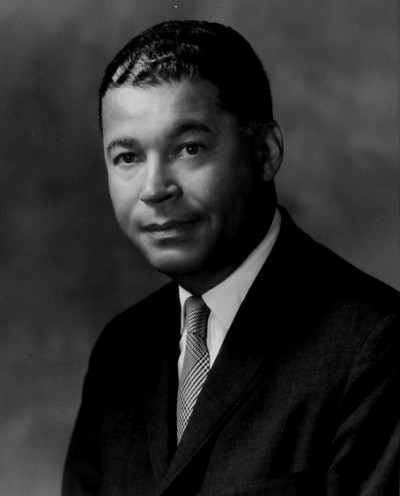Edward Brooke (Edward William Brooke)

In 1966, Edward Brooke defeated former Governor Endicott Peabody with 1,213,473 votes to 744,761, and served as a United States Senator for two terms, from January 3, 1967, to January 3, 1979. The black vote had, Time wrote, “no measurable bearing” on the election as less than 3% of the state’s population was black, and Peabody also supported civil rights for blacks. Brooke said, “I do not intend to be a national leader of the Negro people”, and the magazine said that he “condemned both Stokely Carmichael and Georgia’s Lester Maddox” as extremists; his historic election gave Brooke “a 50-state constituency, a power base that no other Senator can claim.” A member of the moderate wing of the Republican Party, Brooke organized the Senate’s “Wednesday Club” of progressive Republicans who met for Wednesday lunches and strategy discussions. Brooke, who supported Michigan Governor George W. Romney and New York Governor Nelson Rockefeller’s bids for the 1968 GOP presidential nomination against Richard Nixon’s, often differed with President Nixon on matters of social policy and civil rights. By his second year in the Senate, Edward Brooke had taken his place as a leading advocate against discrimination in housing and on behalf of affordable housing. With Walter Mondale, a Minnesota Democrat and fellow member of the Senate Banking Committee, he co-authored the 1968 Fair Housing Act, which prohibits discrimination in housing. The Act also created HUD’s Office of Fair Housing and Equal Opportunity as the primary enforcer of the law. President Johnson signed the Fair Housing Act into law on April 11, one week after the assassination of Martin Luther King, Jr.. Dissatisfied with the weakened enforcement provisions that emerged from the legislative process, Brooke repeatedly proposed stronger provisions during his Senate career. In 1969, Congress enacted the “Brooke Amendment” to the federal publicly assisted housing program which limited the tenants’ out-of-pocket rent expenditure to 25 percent of their income.
During the Nixon presidency, Edward Brooke opposed repeated Administration attempts to close down the Job Corps and the Office of Economic Opportunity and to weaken the Equal Employment Opportunity Commission—all foundational elements of President Lyndon Johnson’s Great Society. In 1969, Brooke was a leader of the bipartisan coalition that defeated the Senate confirmation of Clement Haynsworth, the President’s nominee to the Supreme Court. A few months later, he again organized sufficient Republican support to defeat Nixon’s second Supreme Court nominee Harrold Carswell. Nixon next nominated Harry A. Blackmun, who was confirmed and later wrote the Roe v. Wade opinion. Despite Brooke’s disagreements with Nixon, the president reportedly respected the senator’s abilities; after Nixon’s election he had offered to make Brooke a member of his cabinet, or appoint him as ambassador to the UN. The press discussed Brooke as a possible replacement for Spiro Agnew as Nixon’s running mate in the 1972 presidential election. While Nixon retained Agnew, Brooke was re-elected in 1972, defeating Democrat John J. Droney by a vote of 64%–35%. Before the first year of his second term ended, Edward Brooke became the first Republican to call on President Nixon to resign, on November 4, 1973, shortly after the Watergate-related “Saturday night massacre”. He had risen to become the ranking Republican on the Senate Banking Committee and on two powerful Appropriations subcommittees, Labor, Health and Human Services (HHS) and Foreign Operations. From these positions, Brooke defended and strengthened the programs he supported; for example, he was a leader in enactment of the Equal Credit Act, which ensured married women the right to establish credit in their own name.
In 1974, with Indiana senator Birch Bayh, Edward Brooke led the fight to retain Title IX, a 1972 amendment to the Higher Education Act of 1965, which guarantees equal educational opportunity (including athletic participation) to girls and women. In 1975, with the extension and expansion of the Voting Rights Act at stake, Brooke faced senator John Stennis (D-Mississippi) in “extended debate” and won the Senate’s support for the extension. In 1976, he also took on the role of supporter of wide-scale, legalized abortion. The Appropriations bill for HHS became the battleground over this issue because it funds Medicaid. The pro-life movement fought, eventually successfully, to prohibit funding for abortions of low-income women insured by Medicaid. Brooke led the fight against restrictions in the Senate Appropriations Committee and in the House-Senate Conference until his defeat. The press again speculated on his possible candidacy for the Vice Presidency as Gerald Ford’s running mate in 1976, with Time calling him an “able legislator and a staunch party loyalist”. In Massachusetts, Edward Brooke’s support among Catholics weakened due to his stance on abortion. During the 1978 re-election campaign, the state’s bishops spoke in opposition to his leading role.
Edward Brooke went through a divorce late in his second term. His finances were investigated by the Senate, and John Kerry, then a prosecutor in Middlesex County, announced an investigation into statements Brooke made in the divorce case. Prosecutors eventually determined that Brooke had made false statements about his finances during the divorce, and that they were pertinent, but not material enough to have affected the outcome. Brooke was not charged with a crime, but the negative publicity cost him some support in his reelection campaign, and he lost to Paul Tsongas. On January 3, 2015, Edward Brooke died at his home in Coral Gables, Florida, at the age of 95. He was buried at Arlington National Cemetery, Section 8, Site 5190-5-RH.
Born
- October, 26, 1919
- USA
- Washington D.C.
Died
- January, 03, 2015
- USA
- Coral Gables, Florida
Cemetery
- Arlington National Cemetery
- Arlington, Virginia
- USA



